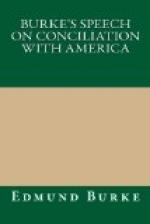Notwithstanding the distinctly modern tone of Burke’s ideas, it would be wrong to think of him as a thoroughgoing reformer. He has been called the Great Conservative, and the title is appropriate. He would have shrunk from a purely republican form of government, such as our own, and it is, perhaps, a fact that he was suspicious of a government by the people. The trouble, as he saw it, lay with the representatives of the people. Upon them, as guardians of a trust, rested the responsibility of protecting those whom they were chosen to serve. While he bitterly opposed any measures involving radical change in the Constitution, he was no less ardent in denouncing political corruptions of all kinds whatsoever. In his Economical Reform he sought to curtail the enormous extravagance of the royal household, and to withdraw the means of wholesale bribery, which offices at the disposal of the king created. He did not believe that a more effective means than this lay in the proposed plan for a redistribution of seats in the House of Commons. In one place, he declared it might be well to lessen the number of voters, in order to add to their weight and independence; at another, he asks that the people be stimulated to a more careful scrutiny of the conduct of their representatives; and on every occasion he demands that the legislators give their support to those measures only which have for their object the good of the whole people.
It is obvious, however, that Burke’s policy had grievous faults. His reverence for the past, and his respect for existing institutions as the heritage of the past, made him timid and overcautious in dealing with abuses. Although he stood with Pitt in defending the American colonies, he had no confidence in the thoroughgoing reforms which the great Commoner proposed. When the Stamp Act was repealed, Pitt would have gone even further. He would have acknowledged the absolute injustice of taxation without representation. Burke held tenaciously to the opposing theory, and warmly supported the Declaratory Act, which “asserted the supreme authority of Parliament over the colonies, in all cases whatsoever.” His support of the bill for the repeal of the Stamp Act, as well as his plea for reconciliation, ten years later, were not prompted by a firm belief in the injustice of England’s course. He expressly states, in both cases that to enforce measures so repugnant to the Americans, would be detrimental to the home government. It would result in confusion and disorder, and would bring, perhaps, in the end, open rebellion. All of his speeches on American affairs show his willingness to “barter and compromise” in order to avoid this, but nowhere is there a hint of fundamental error in the Constitution. This was sacred to him, and he resented to the last any proposition looking to an organic change in its structure. “The lines of morality,” he declared, “are not like ideal lines of mathematics. They are broad and deep, as well as long. They admit of exceptions; they demand modifications. These exceptions and modifications are made, not by the process of logic, but the rules of prudence. Prudence is not only first in rank of all the virtues, political and moral, but she is the director, the regulator, the standard of them all.”




